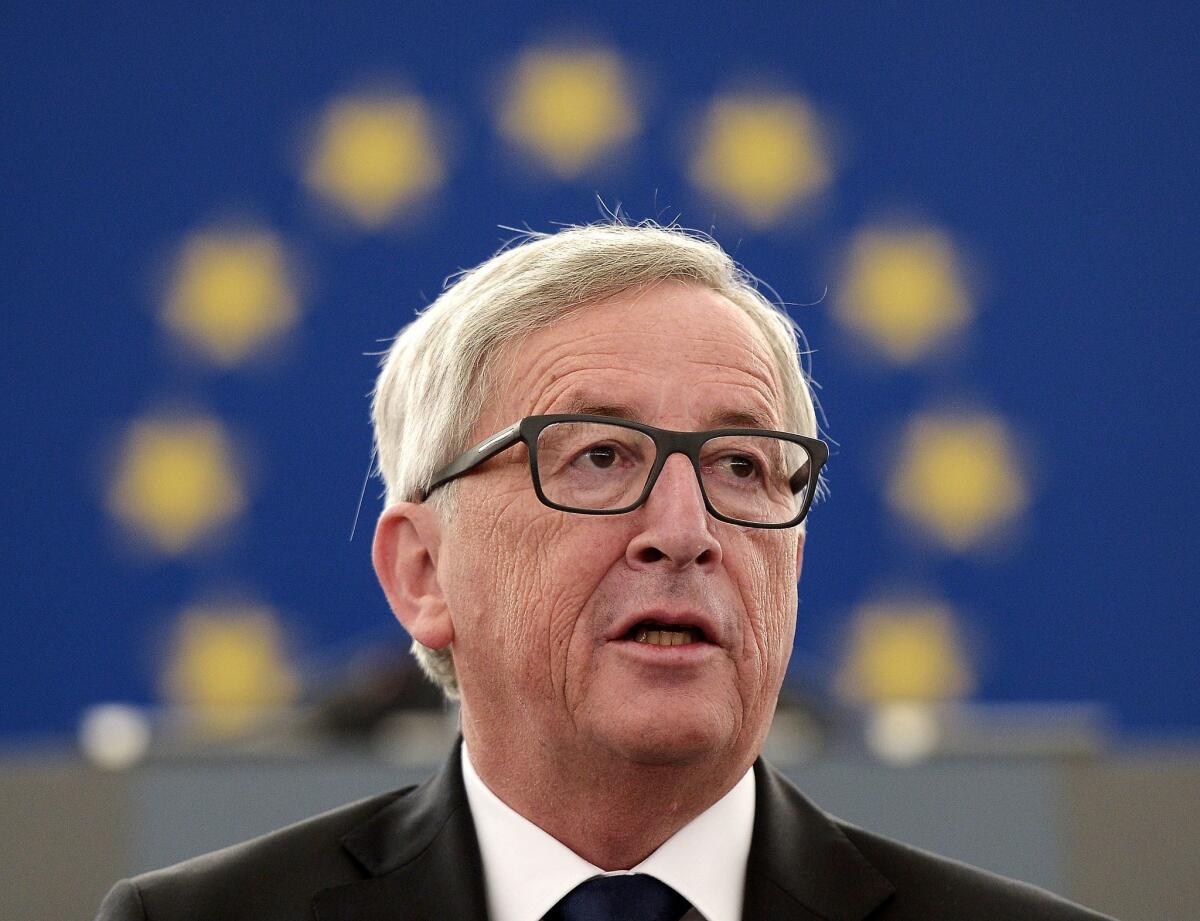‘We have the means to help,’ EU leader tells members on refugee crisis

European Commission President Jean-Claude Juncker speaks about the refugee crisis Wednesday to the European Parliament in Strasbourg, eastern France.
- Share via
Reporting from Leipzig, Germany — Passionately defending the right of asylum for those fleeing war and persecution, the head of the European Union’s executive arm on Wednesday urged member states to divide 160,000 refugees among themselves and to enact broad reforms governing mass entry to the continent.
Europe this year is weathering one of the greatest human displacements it has seen since World War II, with its countries sharply divided over how to cope with the wave of arrivals. Thousands of migrants and refugees are on the move, following an overland route that stretches from Greece to northern Europe, punctuated by many wretched way stations.
Tiny Greek tourist islands have been overwhelmed by the crush of those making the sea voyage from Turkey, and scenes of desperation unfold daily at choke points such as Hungary’s border with Serbia.
FULL COVERAGE: Europe’s Migrant Crisis
“It is high time to act to manage the refugee crisis, because there is no alternative,” European Commission President Jean-Claude Juncker told EU lawmakers in Strasbourg, France, in comments meant to spur action at a meeting of the bloc’s interior ministers in Brussels on Monday.
Reviving a proposal from May to distribute 40,000 migrants and refugees who landed in Greece and Italy, Juncker also called for the placing of 120,000 others who arrived in those countries or crossed the EU’s external border at the Hungarian frontier.
The plan would mark the bloc’s most ambitious effort yet to confront the migrant crisis. However, even if endorsed, it would make only a relatively small dent in the numbers of asylum-seekers arriving in Europe. Poorer eastern countries such as Poland, Hungary and the Czech Republic have been resistant to settlement quotas meant to spread the burden among EU member states.
In appealing for Europe-wide cooperation, Juncker invoked centuries of turbulent history on the continent and declared that fundamental values were at stake in dealing with the migrant wave.
“We have the means to help those fleeing from war, terror, oppression,” he told EU lawmakers. “We, all of us, should remember that Europe is a continent where nearly everyone has at one time been a refugee.”
NEWSLETTER: Get the day’s top headlines from Times Editor Davan Maharaj >>
Germany, with the continent’s most powerful economy, has been the most welcoming of new arrivals, forecasting that it will receive more than 800,000 this year. About 20,000 arrived just over the past weekend.
However, German Chancellor Angela Merkel warned Wednesday asylum-seekers must make a strong case for remaining in the country.
“Those who are not fleeing political persecution or war, but are coming to us out of economic need, will not be able to stay,” she told Parliament.
Follow @laurakingLAT on Twitter for news about the European refugee crisis
MORE REFUGEE CRISIS COVERAGE
Germany’s challenge: How will schools absorb thousands of Syrian children?
Quotas for taking in refugees? European Union pressure mounts
Which countries are taking in Syrian refugees?
More to Read
Sign up for Essential California
The most important California stories and recommendations in your inbox every morning.
You may occasionally receive promotional content from the Los Angeles Times.










